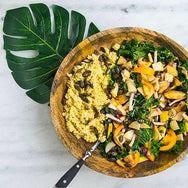
Have you fallen into a diet rut? Are you relying on one-too-many oven pizzas or ‘quick snacks’? While your everyday life can get in the way of eating a healthy diet, we all need to be responsible for how we eat. Following a raw diet—for a short period—could be a smart way to reset your eating habits and get back to basics.
WHAT IS A RAW DIET PLAN?
Put simply, a raw diet is a plan in which you mainly eat raw and unprocessed foods. That means going back to basics and choosing ingredients that have not been treated in any way. Often enough, this diet is plant-based and means mainly eating fruit, vegetables, dried berries, and nuts.
The main rule when it comes to a raw diet is that you can heat food but it shouldn’t be above a specific temperature. While people may make their own guidelines here, that temperature tends to be between 92ºF to 118ºF. That way, the food never gets fully ‘cooked’ and is only warmed when needed.

THE BENEFITS OF A RAW DIET
Now that you know what a raw diet is all about, let’s delve into its benefits. There’s a reason that this plan has become popular lately. According to the Cleveland Clinic, the benefits of adopting this diet plan include:
- Getting more vitamins and minerals from your meals
- Getting phytochemicals (plant compounds that could fight cancer)
- Increasing your fibre intake to improve your digestion
Of course, when you start eating more fruit and vegetables, that is bound to be good for your health. However, you should be aware that strictly adopting this diet could have its downfalls. The truth of the matter is that to follow an entirely raw diet could mean that you lose out when it comes to certain nutrients.

THE LIMITATIONS OF A RAW DIET
With that in mind, before you consider whether this diet plan is for you, you need to look into the possible disadvantages. The experts at the Cleveland Clinic explain that eating a raw diet may mean that you miss out on Protein, Vitamin B12, Vitamin D, Calcium, Iron and Iodine among other things. Put simply, the chances of you getting all that you need from this diet are very slim, even if you do choose to take supplements.
For that reason, you shouldn’t take on the raw diet as a permanent eating plan. Instead, the experts suggest that you may use this as a short-term approach to cleaning up your everyday diet. For example, if you tend to eat a lot of processed foods (hello ready meals!), you may find that this option works for you as a quick reset.
Of course, before you make any significant changes to your diet, you should speak to a doctor. Whether this is right for you will depend on a whole range of factors. Getting all the information ahead of time will help you make the right decision for you. Whatever you do, eating a varied and balanced diet will support your health.

How to Get Started with a Raw Diet
If you’re looking to adopt a raw diet plan, you may want some tips to kick things off. Despite what you may think, this particular plan doesn’t have to be boring. There are plenty of ways to prepare raw food without cooking it. That means that you can still have an interesting and delicious eating plan when you’re following this diet. Let’s take a look at some of the easiest ways that you can get started here:
Start Juicing
Love starting the day with a refreshing juice? If you’re a huge fan of this refreshing treat, you’re going to love this tip. One of the best ways to get the most out of raw fruit and vegetables is to juice them up. There are plenty of combinations that you can use so feel free to be creative.
Keep Things Varied
If you do decide to follow a raw diet plan, the key is to keep things as varied as possible. Since you will already be restricting the things you eat, the more you can spice things up the better. Try making a meal plan for the week so you know what you’re going to eat and have enough different ingredients in the mix.

Keep a Diary
Of course, whenever you start a new diet plan, it’s important to keep track of how it affects you. One of the ways that you can do just that is by keeping a food and health diary. Doing so will mean that you’re fully aware of the impact that your diet is having on your everyday health.
Carry Plenty of Snacks
Following a raw diet? You might find that you get peckish! Carrying plenty of snacks with you is an easy way to stay on track with this plan. You might want to have nuts, berries, or even a banana in your bag at any time. Additionally, you can get raw snacks, such as protein balls, that will keep you going throughout the day.
THE TAKEAWAY!
Eating raw fruit and vegetables could give you a real boost. You can increase the amount of vitamins you’re getting in your everyday diet in one quick and easy move. However, this is not a lifelong meal plan. Before you get started, be sure to speak to your doctor or a nutritionist and take their advice.






























































